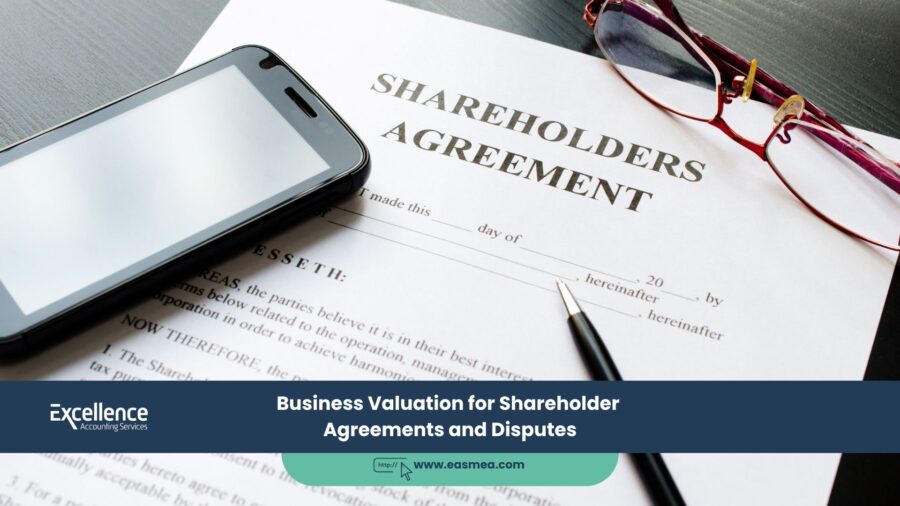Business Valuation for Shareholder Agreements and Disputes
For any privately-owned business with more than one shareholder, the partnership is built on a foundation of shared vision and mutual trust. However, even the strongest partnerships can face challenges. Circumstances change, disagreements arise, and shareholders may need to part ways. It is in these critical moments that the true value of foresight and planning becomes apparent. The single most important tool for navigating these events smoothly and fairly is a clear, pre-agreed mechanism for business valuation.
A business valuation is not just something you do when you’re ready to sell the entire company. It is a vital component of a robust shareholder agreement and the cornerstone of resolving shareholder disputes. Without an objective and agreed-upon method to determine the value of a stake in the business, “trigger events” like the departure, death, or disagreement of a shareholder can escalate into costly, time-consuming, and relationship-destroying legal battles.
This guide will explore the dual role of business valuation as both a proactive tool for shareholder agreements and a reactive solution for dispute resolution in the UAE. We will cover why it’s essential, the common valuation methods used, and how an independent valuation can provide the clarity and objectivity needed to protect the interests of all parties and the business itself.
Key Takeaways
- Valuation is Proactive and Reactive: It’s a tool for preventing disputes (in shareholder agreements) and for resolving them when they occur.
- Shareholder Agreements Must Define Value: A strong agreement pre-defines how shares will be valued upon a “trigger event,” preventing future conflict.
- The 5 D’s: Valuation clauses are triggered by key events like Death, Disability, Divorce, Departure, and Disagreement.
- Independence is Key in Disputes: When shareholders are in conflict, an independent, third-party valuation is the only credible way to establish a fair price for a buyout.
- Book Value is Not Fair Value: Relying on the accounting book value of a company will almost always lead to a significant undervaluation and is not a fair measure of worth.
The Proactive Role: Valuation in Shareholder Agreements
A shareholder agreement is the constitutional document for your business partnership. One of its most critical functions is to create a clear roadmap for what happens when a shareholder needs or wants to exit the business. This is known as a “buy-sell” provision, and it is worthless without a clear mechanism for valuing the shares.
Defining the “Trigger Events”
The agreement should specify the events that would trigger a potential buyout. These are often referred to as the 5 D’s:
- Death: The agreement can provide the company or remaining shareholders the right to buy the deceased’s shares from their estate, providing liquidity to the heirs and ensuring business continuity.
- Disability: If a shareholder becomes permanently disabled and unable to contribute to the business.
- Divorce: To prevent an ex-spouse from becoming an unwanted shareholder through a divorce settlement.
- Departure: When a shareholder voluntarily resigns or is terminated from their role in the company.
- Disagreement: To provide a mechanism for resolving a deadlock or fundamental disagreement on the direction of the company.
Choosing a Valuation Mechanism
The shareholder agreement must specify how the shares will be valued when a trigger event occurs. There are three common approaches:
- Fixed Price: The shareholders agree on a fixed price per share annually. This is simple but rarely works in practice, as businesses forget to update it and the price quickly becomes outdated.
- Formula Method: The value is determined by a formula, such as `4 x Average EBITDA over the last 3 years`. This is more dynamic than a fixed price but can be too simplistic and may not capture the full picture of the company’s value.
- Independent Appraisal: This is the gold standard. The agreement stipulates that upon a trigger event, one or more independent, certified business valuation experts will be hired to determine the fair market value of the shares. This provides the most objective and defensible value.
A well-drafted shareholder agreement with a clear valuation clause is the best insurance policy against future conflict. It replaces emotional arguments with a pre-agreed, logical process.
The Reactive Role: Valuation in Shareholder Disputes
What happens when there is no shareholder agreement, or the agreement is silent or ambiguous on valuation? This is when disputes often arise, and an independent business valuation becomes the primary tool for resolution.
Breaking the Deadlock
A common dispute involves one shareholder wanting to buy out another, but they cannot agree on a price. One party thinks their shares are worth a fortune; the other thinks they are worth very little. This deadlock can paralyze the business.
In this scenario, both parties can agree to jointly hire a single, independent valuation expert. They agree in advance to be bound by the expert’s conclusion. The valuer acts as a neutral third party, conducting a rigorous analysis based on established methodologies like the Discounted Cash Flow (DCF) method. The final valuation report provides an objective, data-driven number that can break the emotional deadlock and form the basis of a fair settlement.
Minority Shareholder Oppression
Another common dispute arises when a minority shareholder feels they are being treated unfairly by the majority owners (e.g., being denied access to information, not receiving dividends). If this leads to a situation where the minority shareholder is forced to sell their shares, a valuation is needed to ensure they receive a fair price.
In such cases, a valuation expert may be called upon to determine the “fair value” of the shares, which might include considering adjustments for lack of control (a minority discount).
Clarity and Objectivity with EAS Valuation Services
Whether you are proactively planning your shareholder agreement or reactively trying to resolve a dispute, a credible and independent valuation is essential. At Excellence Accounting Services (EAS), we provide expert valuation services tailored to these specific situations.
Our Services Include:
- Valuation for Shareholder Agreements: We work with business partners and their legal counsel to establish a fair and robust valuation methodology to be included in your shareholder agreement.
- Dispute Resolution and Litigation Support: We act as independent experts in shareholder disputes, providing clear, defensible valuation reports that can be used in mediation, arbitration, or court proceedings.
- Expert Witness Testimony: Our certified valuers are qualified to provide expert witness testimony to support their valuation findings in a formal legal setting.
Frequently Asked Questions (FAQs)
A shareholder agreement is a legal contract between the shareholders of a company that outlines their rights, responsibilities, and the rules for governing the company. It covers key areas like ownership, management, and, crucially, the process for a shareholder exiting the business.
Without an agreement, you are governed by the default provisions of the UAE Commercial Companies Law, which may not suit your specific situation. A dispute over a shareholder exit can quickly escalate into a costly legal battle with no clear resolution mechanism, potentially forcing the liquidation of the business.
If you use a fixed-price method, you should update it annually. However, the best practice is to use the independent appraisal method, which means the valuation is conducted only when a trigger event actually occurs, ensuring it reflects the company’s value at that specific time.
This is a clause used to resolve a deadlock. Shareholder A can offer to buy Shareholder B’s shares for a certain price. Shareholder B then has two choices: either accept the offer and sell their shares, or they must buy Shareholder A’s shares for the exact same price. It ensures the initial offer is fair.
The underlying methodology is often the same, but the “standard of value” might be different. For a sale, you determine “fair market value.” In a legal dispute, the court might require a “fair value” assessment, which could disregard certain discounts (like for lack of marketability) that would be applied in a market sale.
This can be a point of contention. Often, the parties agree to split the cost of a single, jointly-retained expert. In other cases, each party hires their own expert, and the court or arbitrators will weigh the two reports.
All modern valuation clauses must account for Corporate Tax. Valuations are now based on after-tax cash flows. Any valuation formula in an old agreement that is based on pre-tax metrics like EBITDA is now likely outdated and could lead to an incorrect value.
This is a reduction applied to the value of a block of shares that is less than 50%. Because a minority shareholder cannot control the company’s decisions (like setting salaries or declaring dividends), their shares are considered less valuable on a per-share basis than a majority stake. Whether this discount is applied in a dispute depends on the specific circumstances and the wording of the shareholder agreement.
While a valuer’s report can facilitate mediation, their primary role is to be an objective and neutral expert on value. They are not typically trained mediators. However, their independent report often provides the factual basis that allows a professional mediator to help the parties reach a settlement.
Book value (Assets – Liabilities) is an accounting concept, not a measure of economic value. It is based on historical costs and ignores the most valuable assets of a modern business, such as its brand, customer relationships, and future earning potential. Using book value will almost always result in a severe undervaluation of the company.
Conclusion: The Foundation of a Healthy Partnership
A business partnership is like any long-term relationship—it thrives on clear communication and planning for the future. A well-drafted shareholder agreement with a robust valuation mechanism is the ultimate expression of this foresight. It provides a fair and logical process for navigating the inevitable changes and challenges that every business faces.
By investing in a professional valuation, either proactively as part of your initial agreement or reactively to resolve a dispute, you are investing in clarity, fairness, and the long-term health of the business you have worked so hard to build.
Protect Your Partnership. Define Your Value.
Our expert valuation services provide the clarity needed for robust shareholder agreements and the resolution of complex disputes.




